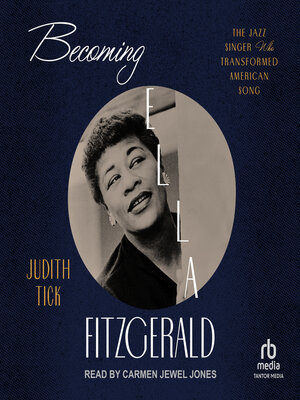Becoming Ella Fitzgerald
audiobook (Unabridged) ∣ The Jazz Singer Who Transformed American Song
By Judith Tick

Sign up to save your library
With an OverDrive account, you can save your favorite libraries for at-a-glance information about availability. Find out more about OverDrive accounts.
Find this title in Libby, the library reading app by OverDrive.



Search for a digital library with this title
Title found at these libraries:
| Library Name | Distance |
|---|---|
| Loading... |
Ella Fitzgerald (1917–1996) possessed one of the twentieth century's most astonishing voices. Historian Judith Tick offers a sublime portrait of this ambitious risk-taker whose exceptional musical spontaneity made her a transformational artist.
Becoming Ella Fitzgerald clears up long-enduring mysteries. Archival research and in-depth family interviews shed new light on the singer's difficult childhood, the tragic death of her mother, and the year she spent in a girls' reformatory school—where she sang in its renowned choir and dreamed of being a dancer. Rarely seen profiles from the Black press offer precious glimpses of Fitzgerald's tense experiences of racial discrimination and her struggles with constricting models of Black and white femininity.
Breaking ground as a female bandleader, Fitzgerald refuted expectations of musical Blackness, deftly balancing artistic ambition and market expectations. Her legendary exploration of the Great American Songbook in the 1950s fused a Black vocal aesthetic and jazz improvisation to revolutionize the popular repertoire. This hybridity often confounded critics, yet Ella reached audiences around the world, electrifying concert halls, and sold millions of records. This book describes a powerful woman who set a standard for American excellence nearly unmatched in the twentieth century.
Becoming Ella Fitzgerald clears up long-enduring mysteries. Archival research and in-depth family interviews shed new light on the singer's difficult childhood, the tragic death of her mother, and the year she spent in a girls' reformatory school—where she sang in its renowned choir and dreamed of being a dancer. Rarely seen profiles from the Black press offer precious glimpses of Fitzgerald's tense experiences of racial discrimination and her struggles with constricting models of Black and white femininity.
Breaking ground as a female bandleader, Fitzgerald refuted expectations of musical Blackness, deftly balancing artistic ambition and market expectations. Her legendary exploration of the Great American Songbook in the 1950s fused a Black vocal aesthetic and jazz improvisation to revolutionize the popular repertoire. This hybridity often confounded critics, yet Ella reached audiences around the world, electrifying concert halls, and sold millions of records. This book describes a powerful woman who set a standard for American excellence nearly unmatched in the twentieth century.







